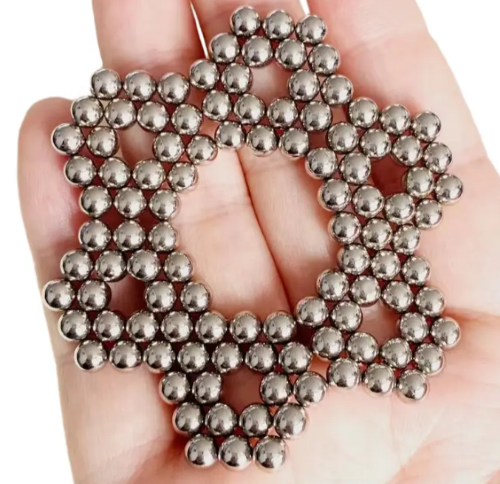A Guide to Features of Neodymium Ball Magnets
1. Introduction to Neodymium Ball Magnets
Neodymium ball magnets, also known as neodymium sphere magnets, are one type of small but mighty magnets sold in the market. They are made of powerful and light-weighted neodymium magnets. Thanks to their strong magnetism and special shape, neodymium ball magnets are applied to diverse fields for demonstration, decoration, and adhesion.

Stanford Magnets offer many sizes of neodymium ball magnets from 1/8” to 2” in diameter. Customized sizes are also available.
2. Coating Materials for Neodymium Spherical Magnets
Since neodymium ball magnets are brittle and easily corroded, they need additional coating and plating to improve their performance. A range of materials are used to make protective coatings for them:
- Nickel: Ni-Cu-Ni is the most common coating material, and its application fields include motors, generators, pumps, and sensors.
- Gold: It is a medical coating with a strong anti-corrosion effect and has a max working temperature of around 200°C.
- Zinc: Famous for good adhesion, they are widely used in low-temperature environments. Their maximum working temperature is approximately 120°C.
- Epoxy: This coating material has excellent performance to fight against salt, ambient air, and humidity. Therefore, it is used extensively in the marine, automotive, and consumer products industries.
- Teflon: Teflon is an ideal barrier for rare-earth magnets, and you can find it mainly in the medical and food sectors. It has a maximum working temperature of about 2500°C
- Chrome: Chrome coating (Ni-Cu-Ni-Cr) stands out for resistance against rubbing and pressure. It is particularly suitable for sphere magnets.
Further Reading: Something You Should Know About Neodymium Magnets Coatings
3. Neodymium Sphere Magnets VS Ferrite Magnets
3.1 Advantages of Neodymium Sphere Magnets
With these coating materials, neodymium spherical magnets offer lots of benefits. Let’s go into a detailed discussion by comparing their performance with regular ferrite magnets.
- Strong magnetic power: Neodymium spherical magnets are considered to be the strongest magnets among permanent magnets. These magnets have a powerful magnetic field of about 1.4 Tesla, while the ferrite magnets’ magnetic field is 0.5-1 Tesla.
- Low density: Thanks to their low density, Nd-Fe-B ball magnets are applied to modern industries to make lightweight instruments.
- High coercivity: The coercivity of neodymium ball magnets is quite high, offering these magnets huge strength in tough environments.

Further Reading: Neodymium Magnets VS Ferrite Magnets
3.2 Slight Disadvantages of Neodymium Sphere Magnets
However, neodymium spherical magnets also have several disadvantages.
- Erosion problem: These magnets are more susceptible to erosion and corrosion. But this problem can be solved by adding coating and plating.
- Higher cost: The cost of neodymium ball magnets is relatively higher because extra moldings are needed. Take your budget into consideration.
- Lower working temperature: Their Curie temperature is lower than that of ferrite magnets, so they might be demagnetized at higher temperatures. You’d better earn about their maximum working temperature in advance.
4. Applications of Neodymium Ball Magnets
-
Educational Demonstrations: Sphere magnets are used in physics and magnetism experiments to illustrate magnetic fields and forces.
-
Magnetic Therapy: Some alternative medicine practices incorporate sphere magnets for potential therapeutic benefits.
-
Toys and Puzzles: Sphere magnets are popular in magnetic construction toys and desk fidget gadgets for creative play.
-
Jewelry and Accessories: Sphere magnets are used in magnetic bracelets, necklaces, and fashion accessories for both function and style.
-
Holding and Fastening: Sphere magnets serve as clasps and closures in bags, wallets, and other small objects.
-
Magnetic Sculptures: Sphere magnets enable creative stacking and modeling, making them ideal for artistic and decorative uses.
-
Sensor and Switch Applications: Sphere magnets play a role in magnetic switches and various electronic components.
-
Prototyping and Engineering: Engineers and designers use sphere magnets in prototyping and testing mechanical and scientific concepts.
5. Conclusion
Neodymium ball magnets have lots of advantages and use for their lightweight and strong magnetic force. Their performance could be enhanced using several coating materials. Hope that you can have a better understanding of these magnets and find suitable neodymium ball magnets for your home or business. Stanford Magnets have rich experience in the manufacturing and R&D of neodymium ball magnets. We’d like to offer more useful information on our site.















